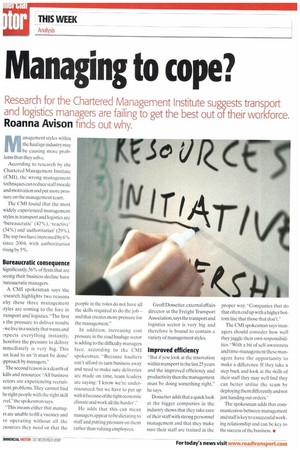Managing to cope?
Page 22

If you've noticed an error in this article please click here to report it so we can fix it.
Research for the Chartered Vanagement Institute suggests transport and logistics managers are failing to get the best out of their workforce.
Roanna Amon finds out why.
Management styles within the haulage industry may be causing more problems than they solve.
According to research by the Chartered Management Institute (CMI), the wrong management techniques can reduce staff morale and motivation and put more pressure on the management team.
The CMI found that the most widely experienced management styles in transport and logistics are 'bureaucratic' (42%). 'reactive' (34%) and 'authoritarian' (29%). The top two have increased by 6% since 2004, with authoritarian rising by 5%.
Bureaucratic consequence Significantly, 56% of firms that are teeing their business decline have bureaucratic managers.
A CMI spokesman says the research highlights two reasons Nhy these three management >tyles are coming to the fore in Tansport and logistics. "The first s the pressure to deliver results -we live in a society that wants and !xpects everything instantly. herefore the pressure to deliver mmediately is very big. This an lead to an it must be done' ipproach by managers."
The second reason is a dearth of kills and resources: "All business ectors are experiencing recruitnent problems. They cannot find he right people with the right skill vel," the spokesman says.
"This means either that managrs are unable to fill a vacancy and re operating without all the sources they need or that the people in the roles do not have all the skills required to do the job — and that creates more pressure for the management."
In addition, increasing cost pressure in the road haulage sector is adding to the difficulty managers face, according to the CMI spokesman. "Because hauliers can't afford to turn business away and need to make sure deliveries are made on time, team leaders are saying: 'I know we're underresourced, but we have to put up with it because of the tight economic climate and work all the harder'.'
He adds that this can mean managers appear to he dictating to staff and putting pressure on them rather than valuing employees. Geoff Dossetter,external affairs director at the Freight Transport Association, says the transport and logistics sector is very big and therefore is bound to contain a variety of management styles.
Improved efficiency But if you look at the innovation within transport in the last 25 years and the improved efficiency and productivity then the management must he doing something right," he says.
Dossetter adds that a quick look at the bigger companies in the industry shows that they take care of their staff with strong personnel management and that they make sure their staff are trained in the proper way. "Companies that do that often end up with a higher bottom line that those that don't."
The CMI spokesman says managers should consider how well they juggle their own responsibilities. "With a bit of self-awareness and time-management these managers have the opportunity to make a difference. If they take a step back and look at the skills of their staff they may well find they can better utilise the team by deploying them differently and not just handing out orders."
The spokesman adds that communication between management and staff is key to a successful working relationship and can be key to the success of the business.
































































































































































































